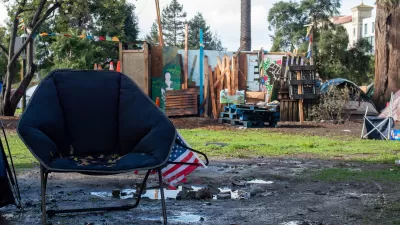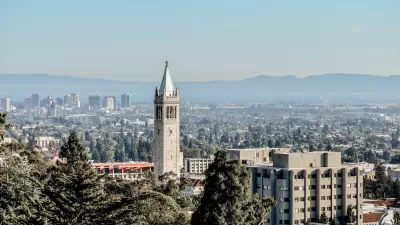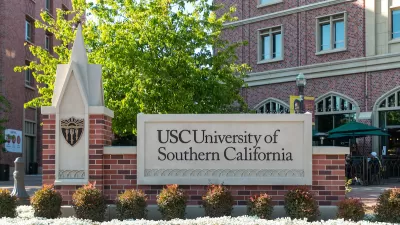Critics of a new provision calling “social noise” an environmental impact say the law can too easily be co-opted by anti-housing groups to block new development.

An opinion piece from early March by Jennifer Hernandez and Robert Apodaca in the Los Angeles Times outlines how community groups have used the California Environmental Quality Act (CEQA) to block new student housing at the University of California, Berkeley.
The authors argue that building more housing close to campus is in fact the more environmentally friendly option. “More students living near campus means less traffic.” But a recent court ruling halted plans for a new housing complex and forced the university to withhold admission from thousands of potential new students, citing the potential impacts of a higher population.
Now, a new court ruling deems noise from college parties an environmental impact, giving NIMBY groups another weapon in their fight against new university housing. The authors see this as a slippery slope to other restrictions. “The concept of ‘social noise’ is perfectly designed to block housing in existing neighborhoods. If this ruling stands, other demographic and individual behaviors could become adverse ‘environmental’ impacts under CEQA.” Meanwhile, the authors point out that students who experience housing insecurity are more likely to drop out, making affordable housing a crucial part of supporting student success.
More on the UC Berkeley story:
FULL STORY: Opinion: How California came to treat UC Berkeley students’ ‘noise’ as a dire environmental threat

Manufactured Crisis: Losing the Nation’s Largest Source of Unsubsidized Affordable Housing
Manufactured housing communities have long been an affordable housing option for millions of people living in the U.S., but that affordability is disappearing rapidly. How did we get here?

Americans May Be Stuck — But Why?
Americans are moving a lot less than they once did, and that is a problem. While Yoni Applebaum, in his highly-publicized article Stuck, gets the reasons badly wrong, it's still important to ask: why are we moving so much less than before?

Research Shows More Roads = More Driving
A national study shows, once again, that increasing road supply induces additional vehicle travel, particularly over the long run.

Judge Halts Enforcement of Anti-Homeless Laws in Grants Pass
The Oregon city will be barred from enforcing two ordinances that prosecute unhoused residents until it increases capacity and accessibility at designated camping sites.

Advancing Sustainability in Los Angeles County Schools
The Los Angeles County Office of Education’s Green Schools Symposium brings together educators, students, and experts to advance sustainability in schools through innovative design, climate resilience strategies, and collaborative learning.

Using Old Oil and Gas Wells for Green Energy Storage
Penn State researchers have found that repurposing abandoned oil and gas wells for geothermal-assisted compressed-air energy storage can boost efficiency, reduce environmental risks, and support clean energy and job transitions.
Urban Design for Planners 1: Software Tools
This six-course series explores essential urban design concepts using open source software and equips planners with the tools they need to participate fully in the urban design process.
Planning for Universal Design
Learn the tools for implementing Universal Design in planning regulations.
City of Moreno Valley
Institute for Housing and Urban Development Studies (IHS)
City of Grandview
Harvard GSD Executive Education
NYU Wagner Graduate School of Public Service
City of Cambridge, Maryland
Newport County Development Council: Connect Greater Newport





























